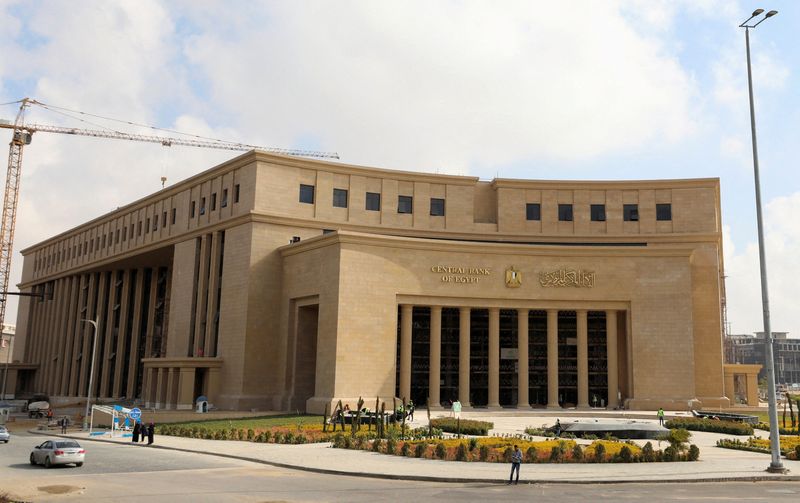
Nafisa Eltahir and Nayera Abdallah
CAIRO/DUBAI (Reuters) – Egypt struck an expanded $8 billion agreement with the International Monetary Fund on Wednesday, hours after the central bank unshackled its currency and raised interest rates by 600 basis points in a bid to stabilize the economy.
In addition, Egypt received another $1.2 billion loan for environmental sustainability, bringing the total loan from the IMF to more than $9 billion, government and IMF officials said. That was closer to the lower end of what some analysts were expecting.
The currency fell to more than 50 Egyptian pounds per dollar – far above previous records – from around 30.85 pounds, a level Egypt had been trying to defend for months. The closing price was 49.4 per dollar.
A more flexible exchange rate was a key demand of the IMF, which was negotiating with officials to expand Egypt’s ongoing $3 billion support program.
In the past, Egypt has said it would move to a more flexible exchange rate, but then revert to tight currency management whenever the pound weakens.
This time, the bet is that an influx of hard currency from investment projects, including a $35 billion investment agreement signed in late February with the United Arab Emirates, will prevent a free fall.
Egypt suffers from a chronic shortage of foreign currency. The central bank said its actions were “underpinned by the continued support of multilateral and bilateral partners” and that “sufficient funding has been secured to tap foreign exchange liquidity.”
Egypt’s international bonds soared in early trading ahead of an IMF deal, with longer-term bonds jumping about 4 cents before giving up some of their gains. Bonds eventually gave back most of the gains, with 2047 bonds up 0.2 cents at 79.9 cents after rising to 83.5, according to Tradeweb.
The premium investors demand for holding Egypt’s international bonds over safe-haven U.S. Treasuries fell to just 529 basis points, the lowest level since June 2021, according to JPMorgan. Last time the spread was 581 bps.
The central bank said it raised the overnight lending rate to 28.25% and the overnight deposit rate to 27.25% as part of a decision to accelerate monetary tightening and reduce inflation, which rose to a record high last year.
“To ensure a smooth transition, the CBE will continue to target inflation as a nominal anchor, allowing the exchange rate to be determined by market forces,” the statement said.
DISPOSAL CLEANING
Foreign exchange shortages have limited local business activity and led to delays at ports and delays in payments for goods.
Remittances from Egyptians working abroad, the country’s main source of foreign currency, have slowed sharply amid expectations that the pound will fall.
The war in Gaza and Yemen’s Houthi attacks on shipping in the Red Sea have threatened revenue from tourism and Suez Canal shipping, two other key sources of hard currency.
“Unification of the exchange rate is critical as it helps eliminate foreign exchange hoards,” the central bank said.
Since the start of 2022, as foreign exchange shortages have worsened, the pound has lost about half its value against the dollar in a series of phased devaluations.
Although the central bank already had an inflation target, it also sought to manage the pound.
The Feb. 23 announcement that Emirates sovereign wealth fund ADQ would invest $24 billion in new money and convert $11 billion of existing deposits within two months for property development and other projects eased pressure on the currency, with the black market rate strengthening to lower levels . more than 50 pounds, up from more than 60 pounds previously.
In foreign exchange markets on Wednesday, one-month non-deliverable forwards were trading at around 51 to the dollar, just above the spot rate, but 12-month contracts were trading just above 55 to the dollar, indicating the currency may need to correct slightly. more in the coming months.
Another return to exchange rate management would limit the benefits of Wednesday’s decision, said Kaan Nazli, portfolio manager at Neuberger Berman.
“I think the proof will be in the pudding, but thanks to the UAE funding, the chances are better than before,” he said.
Analysts say doubts remain about Egypt’s commitment to structural reforms it has often delayed, including reducing the influence of the state and military on the economy.
In addition to debt to foreign companies, the country also faces a difficult external debt repayment schedule.
As of December 31, the banking system, including the central bank, had a net foreign asset deficit of 841 billion Egyptian pounds ($27.2 billion).


